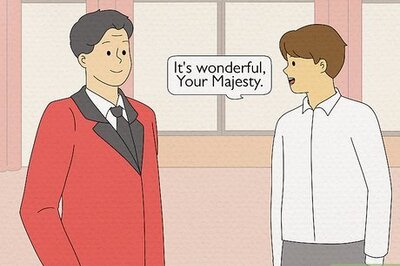
views
AskHigh blood pressure (hypertension) can damage the body prior to the emergence of symptoms. Uncontrolled high blood pressure can cause disability and damage tiny, delicate blood vessels that supply blood to the eyes. Hypertension can cause damage to the blood vessels in the retina, the area at the back of the eye where images are focused. This eye disease is known as hypertensive retinopathy. The damage can be serious and sight threatening, if hypertension is not treated.
High Blood Pressure will damage your eyes in multiple ways. It will:
Damage the blood vessels in the retina (retinopathy): Damage to blood vessels in the light-sensitive tissue at the back of the eye (retina) can lead to bleeding in the eye, blurred vision and loss of vision. Lack of blood flow to retina leads to blurred vision or the complete loss of sight. Managing blood pressure is also the only way to treat hypertensive retinopathy.
Fluid build-up under the retina: It can result in distorted vision.
Nerve damage: Blocked blood flow damages the optic nerve, leading to partial field loss or complete vision loss.
Stroke and eye impact: In addition to threatening the anatomy of the eye, high blood pressure can also cause a stroke, which can impair the optic nerve or damage the area of the brain responsible for processing images.
Symptoms of Hypertensive Retinopathy
Normally Hypertensive Retinopathy is asymptomatic and usually discovered during a routine eye exam. Symptoms of more severe and accelerated hypertension might include headaches and blurred vision.
How Is Hypertensive Retinopathy treated?
The best way to treat hypertensive retinopathy is to adequately control your blood pressure. A healthy lifestyle with reduced intake of salt, regular exercise and mediation will keep high blood pressure under control.
In conclusion, it is important to keep it in mind that studies have proven that the signs of mild hypertensive retinopathy are seen frequently in around 10% of the general, adult non-diabetic population. Hypertensive retinopathy signs also have association with other indicators of end-organ damage (like left ventricular hypertrophy, renal impairment) and may be an indicator of future clinical events such as congestive heart failure, stroke, and cardiovascular mortality. A variety of heath factors are related to the hypertensive retinopathy condition and measures have to be taken to ensure that the medical condition is resolved early and prior to the occurrence of any problem with the eyes.
Read all the Latest Lifestyle News here


















Comments
0 comment